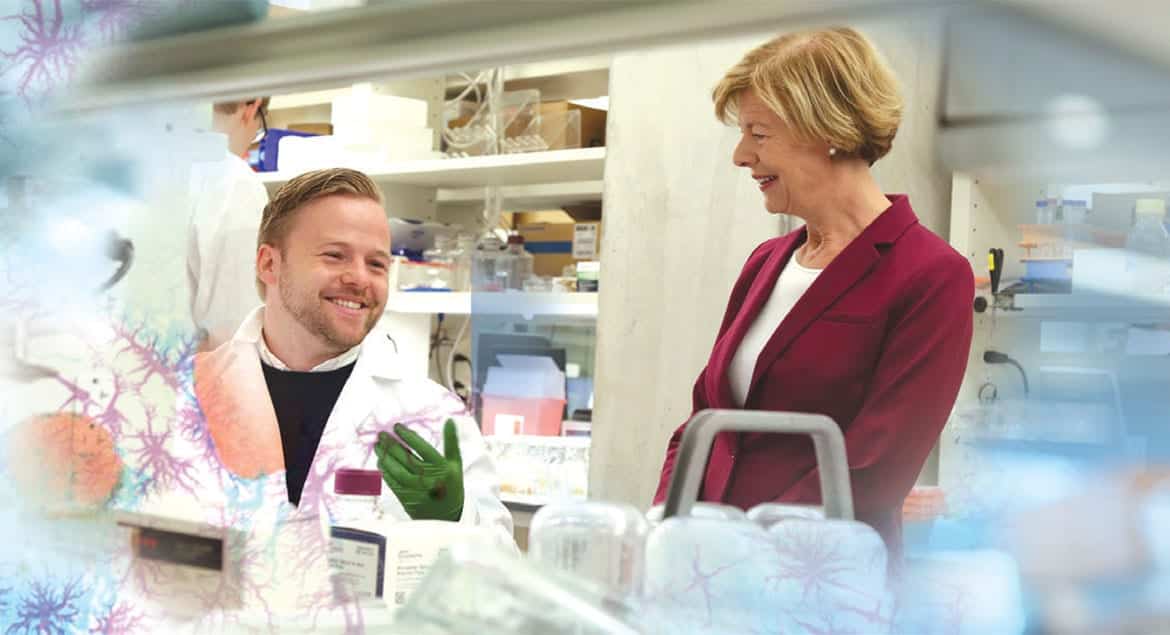Brad’s Update
I am excited to bring this report to you right now. Typically, we send this report in fall, but there’s been so much momentum, that we are bringing a second edition into your hands now.
Why? Because you’re making a difference.
As a donor to the Morgridge Institute, you are helping scientists explore uncharted scientific territory to discover tomorrow’s cures. Because of you, scientists are studying promising areas of biomedicine that can improve human health.
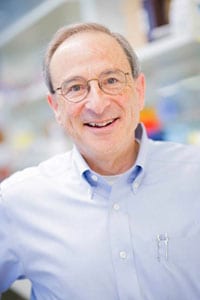
Brad Schwartz
In this report, you’ll read about the legacy of U.S. Senator Tammy Baldwin’s grandfather in the booming field of metabolism. You’ll also learn about work to stop a neglected tropic disease, efforts to elevate the humble toilet, and many more projects that are shining a light on biomedicine.
You’ll also read about fun, hands-on science opportunities for underserved children and families. Your donations provide transportation scholarships and support many free or heavily-discounted programs including science field trips, the Rural Summer Science Camp, and the Wisconsin Science Festival—just to name a few.
We depend on you. In science, there is always the next frontier, and there’s more to understand, learn, and question. It is only the best scientists who are poised to explore that next frontier.
Thank you for believing in science that will improve human health. You invigorate and inspire us in this journey.
Brad Schwartz, M.D.
CEO, Morgridge Institute for Research
P.S. Your voice matters. If you have any questions about the stories in this report, please don’t hesitate to contact me at giving@morgridge.org.
As a donor, you are:
Exploring Science, Fearlessly
Donors like you help scientists pursue fearless science. Thank you for supporting biomedicine that will improve human health. With your support, you’re helping fight disease, understand the depths of biology, unlock ways to stop cancer, HIV, and many more disorders.
Changing Lives
Science is for everyone. You help many free and heavily-discounted science education and outreach programs for underserved children and families. From afterschool programs to the Rural Summer Science Camp, these opportunities bring the wonders and joy of science to all families.
A Legacy of Science
Celebrating U.S. Sen. Baldwin’s Grandfather
Modern science and childhood memories combined in October for U.S. Sen. Tammy Baldwin, who visited the Morgridge Institute Metabolism Theme carrying on the inspired legacy of her grandfather, David E. Green.
Baldwin, who was raised by her grandparents in Madison, spent many days visiting her grandfather’s lab just a few blocks away from the Morgridge Institute, at the UW–Madison Enzyme Institute. Green was the original director of the Enzyme Institute and led the program through the golden years of metabolism science, where one fundamental discovery after another was coming out of UW–Madison.
“That sort of rigor and commitment to a calling, a quest, is something that rubbed off on me quite a bit.”
U.S. Sen. Tammy Baldwin
Metabolism is the process by which the body uses food and oxygen to produce the energy and chemicals needed for essential functions and processes that constitute life. Commonly referred to as the “chemistry of life,” metabolism science is having a renaissance today.
Back in the 1950s, Green was using one of UW–Madison’s first electron microscopes, but the technology today opens up entirely new capabilities that generation couldn’t have dreamed of. Today, scientists at the Morgridge Institute are using CRISPR gene editing technology to disrupt different genes, then apply tools like mass spectrometry and cryo-electron microscopy to determine exactly what function those genes are tied to.
“This is super special because of the story of my grandfather’s contribution to what is happening here in the lab right now,” Baldwin says.
Baldwin’s visit in October gave her the opportunity to tour the institute and learn more about metabolism.
She says the visit brought back “warm memories.” One she described was the six-mile walks her grandfather would take for workday exercise.
“When I had a chance to come with him, he was always thinking about the next experiment or talking about what he had discovered,” Baldwin says. “That sort of rigor and commitment to a calling, a quest, is something that rubbed off on me quite a bit.”
Numbers of Note
170
Morgridge Employees
(faculty, staff, students)
92
UW–Madison partners engaged in Morgridge research
64
Active research projects in 2019
15
Principal Investigators
- 2 Howard Hughes Medical Institute investigators
- 2 Members of National Academy of Sciences
- 3 NSF CAREER Award winners
- 1 NIH Presidential Early Career Award winner
58,000+
Average annual participants in Discovery Outreach programs
2019 Milestones
Science moves forward because of YOU. We count on a community of supporters like you to provide financial support that helps scientists improve human health, and spark a curiosity in science for underserved children and families.
Here’s a look at some of last year’s milestones made possible by your support.
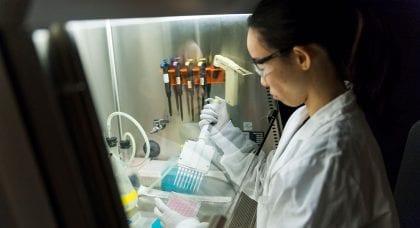
A new way to fight schistosomiasis
A team led by Morgridge investigator Phillip Newmark isolated a natural chemical that acts as a potent kryptonite against schistosomes, the parasitic worms that burrow through human skin and cause devastating health problems. The discovery could lead to new ways to fight the neglected tropical disease schistosomiasis, which affects more than 240 million people in Africa, Asia and parts of South America.
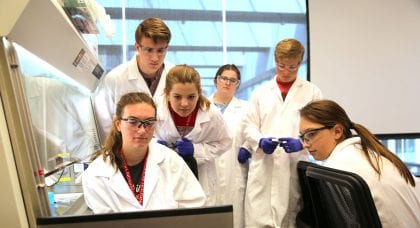
Students get more summer science
Thanks to donors like you, the Rural Summer Science Camp expanded to include a third camp last year. Not only that, but donors like you and support from BioForward, an association representing more than 200 biohealth companies in Wisconsin, helped 25 more students and their teachers dig into cutting-edge science.
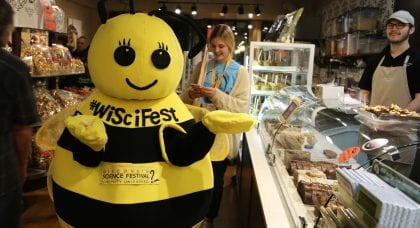
9th Wisconsin Science Festival goes big
More than 30,000 participants stoked their curiosity at 300+ events for the 2019 Wisconsin Science Festival. Hundreds of businesses, schools, universities, civic groups, libraries and museums joined together to engage more Wisconsin cities and counties than ever before. Thank you to sponsors and donors who make the festival possible!
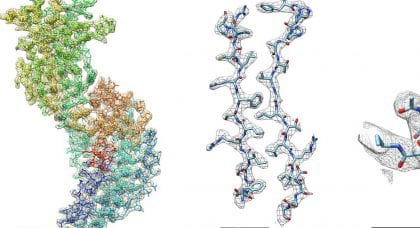
Cryo-EM innovator joins Morgridge Institute
Cryo-EM is a revolutionary imaging technology that allows scientists to peer into the very surfaces where drugs and proteins interact, or where viruses orchestrate their cellular attacks. Tim Grant, a biochemistry professor and cryo-EM pioneer, recently joined the institute as a new virology investigator.
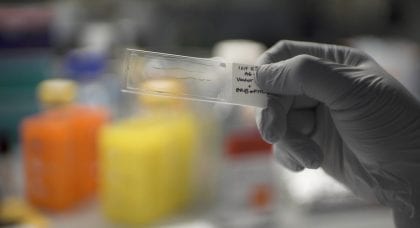
How tapeworms get ‘ahead’ in life
Tapeworms are famous for the enormous lengths they reach. Morgridge scientist Tania Rozario found an essential clue to this process: The stem cells that make regeneration possible were in close proximity to the worm’s head. This insight helps explain how tapeworms grow in their human and animal hosts, and could be helpful in finding new ways to target the parasites.
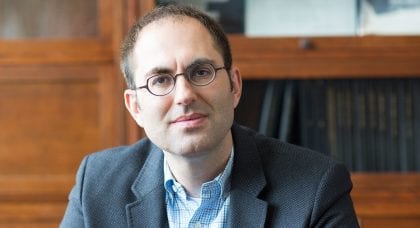
Can ‘smart toilets’ be the next health data wellspring?
The humble toilet could tell us a lot. Morgridge affiliate Josh Coon and his team are working to put the tremendous range of metabolic health information contained in urine to work for personalized medicine. The team completed a study that measured the metabolic signatures of urine samples and found striking results that correlate with daily life patterns, such as exercise, sleep, diet and alcohol consumption.
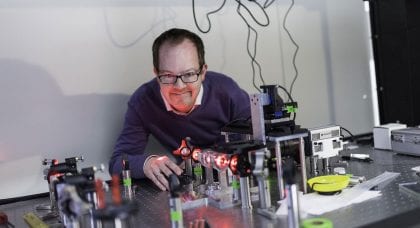
An order of microscopes, to go
Jan Huisken’s vision to get advanced microscopes into the hands of biologists got a big boost this year, with $1 million from the Chan Zuckerberg Initiative. His lab is building custom light sheet microscopes called “Flamingos” to travel between labs and serve as accessible, shareable tools. By the end of 2019, the Flamingos were in use at more than a dozen labs at Harvard University, Marine Biology Laboratory, Duke University and Boston Children’s Hospital.
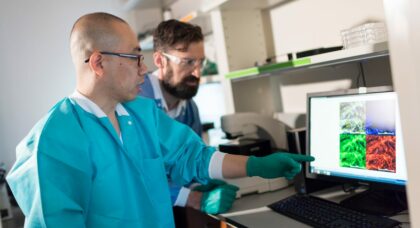
The quest for bioengineered transplant arteries
The Thomson Lab is working toward a dream of using stem cells to build engineered human arteries, a development that could bolster cardiovascular surgery success. The team identified a better way to grow smooth muscle cells. They hope this work is a stepping stone that leads to more advanced tissue engineering, and could pave the way to create human blood vessels for transplantation.
A look at the 2019 Wisconsin Science Festival
33,168
attendees over one weekend
336
events
92
Wisconsin Communities
Science for All
When you establish a planned gift, you help inspire the next generation of scientists. Planned gifts through an estate or annuities help support science education and outreach activities, like the Rural Summer Science Camp.
Contact Bill Swisher, Chief Development Officer, today.
bswisher@morgridge.org
(608) 316-4364

